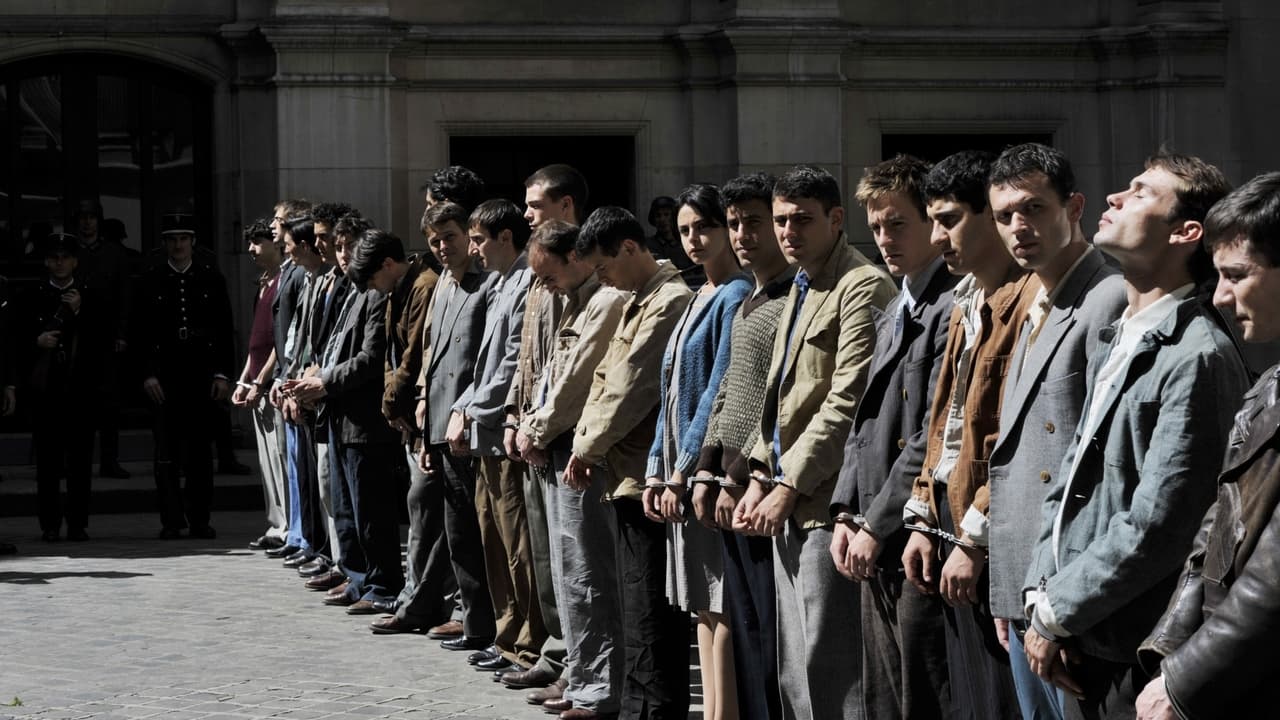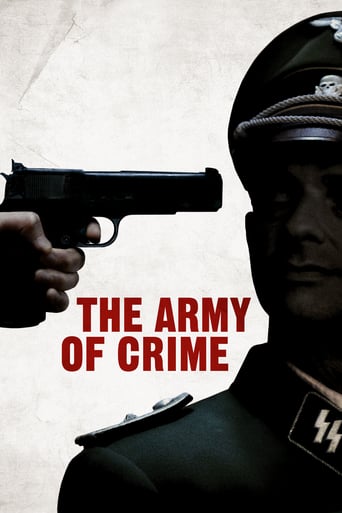Boobirt
Stylish but barely mediocre overall
Nonureva
Really Surprised!
Phonearl
Good start, but then it gets ruined
Sabah Hensley
This is a dark and sometimes deeply uncomfortable drama
Ben Larson
Liberté, égalité et fraternité. The motto of France is certainly not very apt to describe the time of Nazi occupation. The nationalistic French mainly capitulated to the Germans, and left the resistance to a bunch of immigrants - Italians, Armenians, Jews, Hungarians, Spaniards, etc.This is the real Inglorious Basterds. The story of those who continually picked at the Germans and made their lives miserable. They don't go home in glory, but their names are on a role of honor for those who served to fight oppression everywhere.An American poet, Missak Manouchian (Simon Abkarian), and his wife Mélinée (Virginie Ledoyen) lead the group.Director Robert Guédiguian does an excellent job of capturing the period, and letting us get to know the actors before the action starts.
bryanmillsfist
The men and women who resisted the Germans in WWII were the living embodiment of Emiliano Zapata's famous words. Some used peaceful means(The White Rose Society), other violence.(Maquis) This movie details the story of those who embraced violence in order to resist the Nazis.What I particularly liked about this movie was its portrayal of the collaboration necessary to crush such movements. The french police was tacitly involved in the suppression of France's resistance movements. Along with the infamous Milice, the french police provided the Gestapo a means to violently smash those who dared fight back. "Army of Crime" does a nice job of showing the underhanded the methods the french police would use to betray their countrymen.People who feel uneasy about the brutal means used by such movements should do two things: A) Understand that war is brutal in every aspect. A soldier's life is no less valuable then a civilians. B)Realize that the only way to effectively deal with the Nazis' was to meet them with the same level of ferocity and ruthlessness that they dealt out to others. Ethics mean nothing if one is not able to live them. Under normal circumstances those in the resistance would not have done what they did, but then these were not normal circumstances.I laud these heroes for dying fighting merciless brutes. It is not glorious to die for one's country, but it is honorable to die to protect what you cherish most.
max-vernon
Communists come in all types, from harmless to ruthless: armchair theorist, industrial and peasant organiser, fighter against the class enemy, assassin. This film deals with the last two varieties and accords them some moral scruples. The Manouchian Group decline to blow up a brothel containing German soldiers and French girls; their poet-leader Missak Manouchian initially refuses the path of violence because his 'ethics' forbid him. Nazi-Vichy propaganda famously denied them any scruples by calling them an 'Army of Crime'.It may be that the film sanitises and romanticises both their violence and their contribution: using the attractive Virginie Ledoyen to play the role of Manouchian's wife certainly increases one's sympathy for the main protagonist. 'Flame and Citron' (2008) and 'Max Manus' (2008) deal with similar material and clearly do not romanticise violent resistance to the Nazis. Both these films leave one wondering if the anti-German actions depicted were truly worthwhile or simply futile and counterproductive.Army of Crime's aim is to rehabilitate these foreign Jews and Communists so they may join home-grown heroes in the Pantheon of The French Resistance. In that respect it hopes to accomplish what 'Paths of Glory' (2006) and 'A Love To Hide' (2005) successfully achieve for French Muslims and homosexuals. It is no wonder that it bombed at the box office, not that it is a bad film, but because its subject matter is so difficult and obscure and morally ambiguous for modern audiences facing 'terrorism' in a new guise.The film is good at explaining the motives of the (mainly) young men who decide to shoot and bomb occupying Germans. Jewish families rounded up by Vichy police for the Germans, Republican fighters from the Spanish Civil War, anti-fascist refugees from Hungary and Romania combine to produce individuals with an axe to grind. They have seen Fascism up close and find it brutal and nasty. Their vendetta is personal. The assassinations and bombings are depicted well, in particular the shortage of weapons and lack of expertise in their use.Less well depicted is the issue of German reprisals for such 'terrorism'. The film refers to imprisoned Communists being shot in retaliation but no mention is made of the many non-Communists – 'innocent civilians' - who paid the ultimate price for 'Communist terrorism'. Most early resistance groups disapproved of terrorism, seeing it as futile, dangerous and leading nowhere. Hitler's attack on Russia in June 1941 saw Stalin ordering the French Communist Party to organise an immediate 'Second Front' in order to take the pressure off the Russians.On 21st August 1941 the Communist Pierre Georges assassinated a German soldier at a Paris Metro station. Other killings soon followed. The Germans shot 50 randomly selected hostages in October. A vicious cycle of attack and reprisal had begun. The Vichy police had largely wiped out the Communist underground by the summer of 1942 and the film shows them dealing efficiently with Manouchian a year later. Active resistance was always a minority affair and informing was widespread.By 1943-4 Germany was losing the war and opinion was turning against Petain and in favour of more violent resistance. The Jewish deportations had begun and the film shows this as a prime motive in the Manouchian Affair. Manouchian refers to the Armenian genocide which killed his parents to explain his own empathy for his Jewish Communist comrades.Asking an off-duty German soldier for a light and then shooting him at point blank range may seem rather brutal. So was Vichy torture. So was the Allied bombing of women and children. So were the Nazi deportations to the death camps. The only important question is, 'Did these attacks on Germans do any good?' When asked about the impact of the French Resistance on German war production, Albert Speer famously replied, 'What French Resistance?' Vichy continued to send labourers, food and materials to Germany and to pay for the occupation. Quantifying the contribution of the French Resistance to Allied victory remains problematic and this film provides no answer.What the film does do is remind us how important the idea of Resistance was in forging post-war French identity. French Communists and their contribution were frozen out of the story as Gaullists and ex-Vichyists joined to create the Fourth French Republic which soon joined the anti-Communist NATO alliance. Anti-Nazi Germans, Spaniards, foreign Jews and Communists who fought alongside 'indigenous' Frenchmen in the 'Resistance' were largely excluded from this new national myth –making. This is what the film aims to redress.As well as settling personal scores with the Nazis, the Manouchian Group were fighting for a Communist future. Throughout the Cold War period the Communist Red Orchestra in Germany (the subject of 2 little-known films) and the Manouchian Group in France were seen as Stalin's agents. Little sympathy in the West.History was also being manipulated on the other side of Europe. How appropriate that the Polish film 'Katyn' should be released at the same time as 'Army of Crime.'! 15 months before ordering French Communists to wage war on occupying Germans, Stalin had decided to wipe out the Polish upper-class intelligentsia who did not fit in with his idea of a Communist future. Until 1989 Communist orthodoxy demanded that the 20,000 murdered Polish officers were victims of the Germans, not the Soviets.I wonder if Karl Marx ever envisaged that 'Das Kapital' might be used to deliver a bomb to a bookshop ? Communism is a great idea. Like all great ideas it can bring out the best and worst in people. However, viewed from my own comfortable life lived through the best half of the 20th Century, I find it difficult to judge these young men who fought a ruthless foe. Within the first 6 months of the occupation, the Germans had beaten up the prefect Jean Moulin and shot Jacques Bonsergent for simply raising his fist against them. Moral ambiguities make this a difficult, murky, subject for a film.
oOgiandujaOo_and_Eddy_Merckx
Paris in the sunshine... through meshed windows. Several normal-looking men and women travelling in a grilled bus. A woman sees another woman wheeling a pram along a promenade, she wonders aloud whether the pram contains bombs. On a boating lake a man is scratching away on a sketch pad whilst his paramour drapes alluringly in the prow. He's not sketching her though, we cut to the pad and see that he's a pamphleteer. "Fair is foul and foul is fair" is the view we are given in this short space of time at the start of Army of Crime, Robert Guédiguian's vital new movie. Marcel Ophüls' 1969 documentary The Sorrow and the Pity is all anyone needs to see to comprehend the loathsome extent to which the government in France (uniquely) collaborated with murderous fascists. However folks are no longer keen on seeing four hour long black and white documentaries what with their absence of music video effects and popular music and such. So Guédiguian has revived the history, and not just for revival's sake, also to counter contemporary anti-immigrant prejudice. Whilst the naturalised French, in large proportion failed to resist the Nazis, many French immigrants on the other hand laid down their lives in the Communist resistance. By contrast, the low point of the entire collaboration was when a twentieth century French police force decided to resurrect the Carthaginian traditions of mass child sacrifice, and chose as their Tophet, the Velodrome d'Hiver. Without the help of a single Wehrmacht soldier, SS soldier, or Gestapo thug, the French police rounded up 13,000 Jewish souls including 4,000 children, who were then shipped off to Auschwitz. Against these existential lepers of the Gendarmerie stood Missak Manouchian and his band of fighters (the FTP-MOI), many of whom had already fought the tide of fascism in Spain.Manouchian is a very interesting character who perhaps received the most character development of all the fighters. He was an Armenian refugee, who survived the Armenian Genocide, which was perpetrated by the Ottoman Army. Out of the silence that followed his terrifying experiences grew his poetry, which was beautiful (based on the example we see in the film). He has to take two key compromises during the film. In order to escape from a camp of hostages, he has to sign a document declaring that he is not a communist. Initially he refuses to sign, but in order to live he eventually does. The second key compromise is when he agrees to kill even though he does not believe in killing, calling it "unethical". It is very difficult for the fighters, they are so full of life, they decide that they must be the enemies of the enemies of life.Please note that there is a scene of gruelling torture in this film, committed of course by the French police.It's one of those rare films that is actually edifying, where you come out with a will to live, a will to do right, and a will to speak out against racial intolerance. It is the polar opposite of the crass and odious Inlgorious Basterds, still playing at the cinema, and attracting over a hundred times more spectators.

